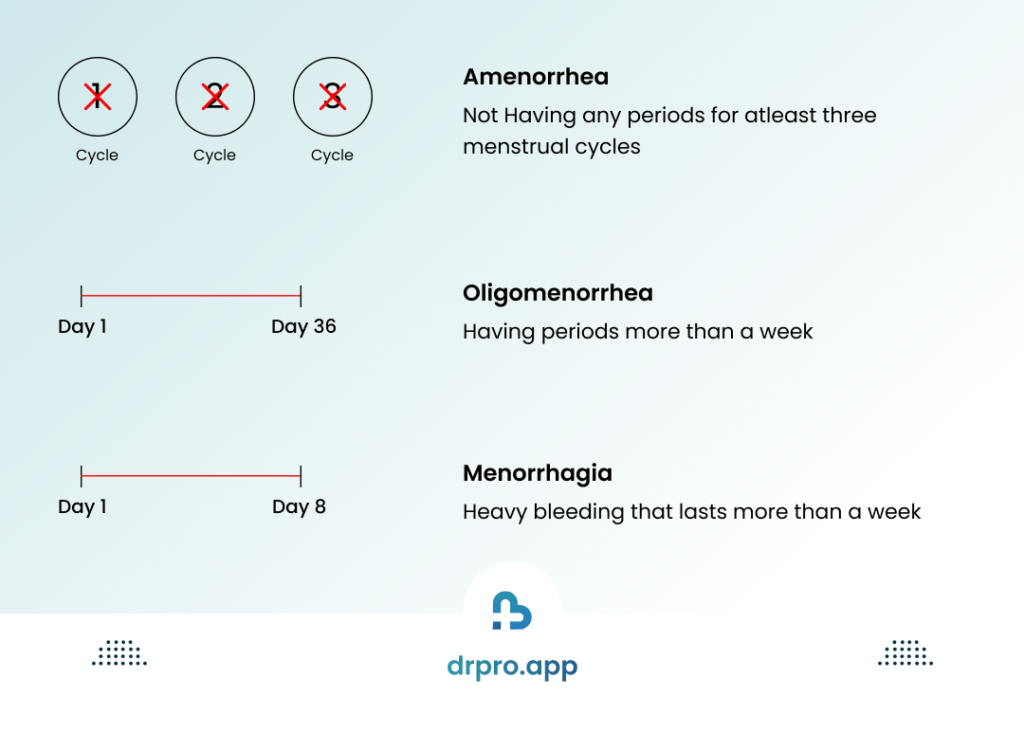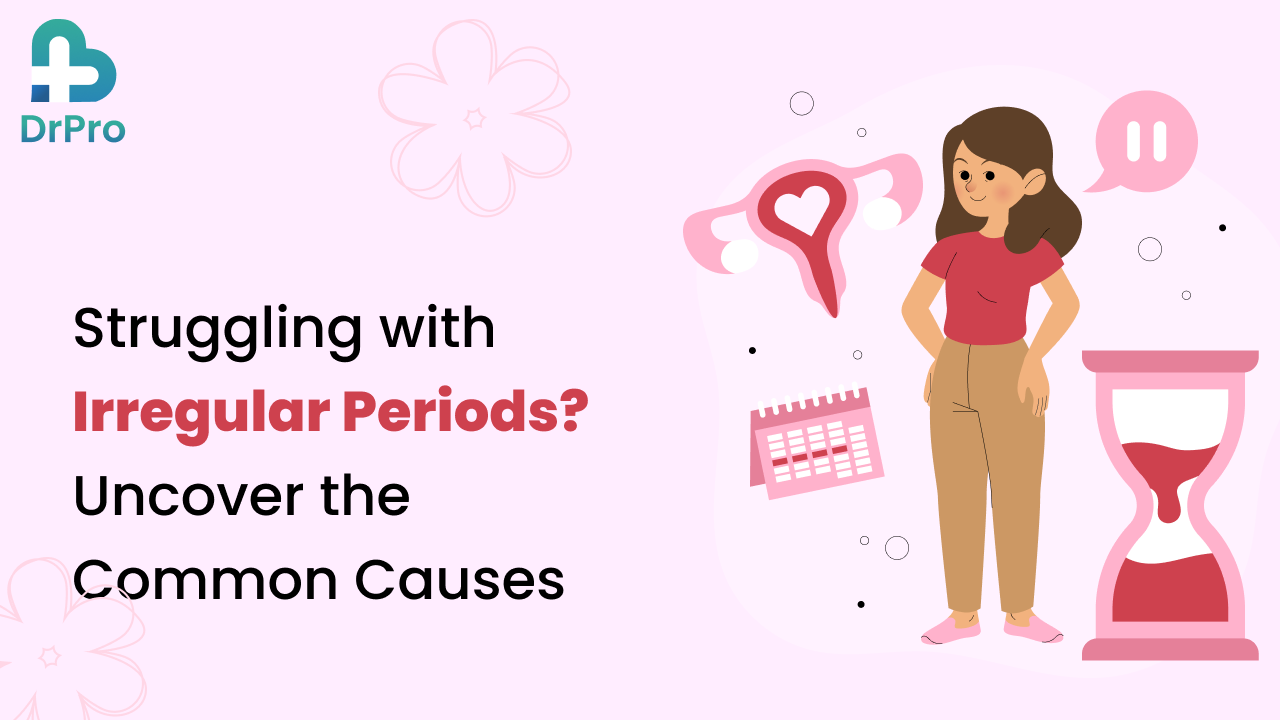Quick Summary:
Abnormal or missed menstrual cycles can interfere with a woman’s everyday activities indicating fluctuations in hormones or other illnesses. In this article we discuss the signs, symptoms, and when it should warrant seeing a health care professional. Find out more about what is considered an Abnormal menstruation cycle and how to manage it.
Introduction:
Periods are normal among women but not all menstruous cycles happen like this one in the video. Pregnancy is natural, but it is also perfectly reasonable to feel concerned if your periods are irregular or if you have irregular cycles—those that are long or short, or those that may not come at all. Irregular periods may therefore stem from decisions such as changes in diet or rich diets, stress, or hormonal conditions like the Polycystic Ovary Syndrome (PCOS). To take proper care of one’s reproductive system it is crucial to comprehend why one has an irregular menstrual cycle.
A woman’s menstrual system is an important barometer of her general health. The abnormal cycle is an indication of some sicknesses or can just be due to hormonal changes such as stress or a weight change. In either case, it is important to know when your cycle is irregular and hence how it can be managed in a way to avoid future consequences to your bodily structure.
In this article, I will be looking at what can lead to an irregular period, how to deal with it, and when you should consult the practitioner.
What Are Irregular Periods?
An irregular period means that the cycles do not have any specific touchstone to do with the time it takes on a specific period, or the thickness and the heaviness of the blood flow, or the length of the period. If cycle length remains outside this range or if there are variations in the intensity and duration of flow then they define a period as irregular. For instance, if your periods start more than a week ahead of schedule or are not for more than a week at a time, regularly, then they will be called irregular.
Irregular periods are a common experience that can be influenced by various factors, including stress, hormonal imbalances, or underlying medical conditions like PCOS. By understanding the causes and managing your lifestyle, it’s possible to regulate your menstrual cycle and maintain overall health. However, when irregularities persist, consulting a healthcare professional is vital to identify potential health concerns.
For those seeking better management of their reproductive health, systems like DrPro offer innovative healthcare management solutions, making it easier to track and monitor your menstrual health and overall well-being. Taking control of your health has never been more accessible.

Common Causes of Irregular Periods
The attitude or absence of periods can be the result of various factors that relate to group one as the common ones are those that are attributable to behavioral causes while the ones in group two are the medical causes of the attitude or absence of periods. In the next sections, we highlight what we consider to be the most common reasons for irregular menstrual cycles.
Hormonal Imbalances:
Endocrine dysfunctions are well-known agents of menstrual irregularity amongst women of reproductive age. Both Estrogen and progesterone are hormones that play a significant role in your menstrual cycles. Hormone levels may rise or drop, and such changes cause irregular or even absent periods. Influences such as puberty, pregnancy, and menopausal change are normal factors that affect changes in the level of secretion of hormones. However, situations like PCOS or thyroid problems can also be the cause of severe hormonal fluctuations.
Stress:
Stress can significantly affect your hormone balance and hence the consequence of having disturbed cycles. When stressed the body releases cortisol, which blocks the secretion of the reproductive hormones. The presence of stress for an extended period can lead to missed periods or periods delayed. Some of the things that can help control cortisol levels include practicing yoga, meditation, and mindfulness which would allow the regulation of your cycle.
Thyroid Disorders:
This gland is instrumental in the control of hormones and those related to your menstrual cycle are not exempted. Hyperthyroidism or thyrotoxicosis is a condition where the thyroid gland is overactive and thyropathy, and hypothyroidism where the thyroid gland is under-active can interfere with a woman’s periods and lead to irregularities. The disorders of the thyroid can also affect the flow wherein periods may become heavier or lighter.
Weight Fluctuations:
Huge fluctuations, whether in weight loss or weight gain can upset the normal cycle of your menstruation. Starvation from diets, anorexia, bulimia, and other such weight loss programs can cause obesity-induced amenorrhea because the body no longer has the required energy foods for proper reproduction. And weight gain. Women with PCOS often have higher-than-normal levels of androgens, which disrupt ovulation. This disruption leads to fewer periods or irregular cycles.
Thyroid Disorders:
Your thyroid gland plays a critical role in regulating hormones, including those involved in your menstrual cycle. Both hyperthyroidism (an overactive thyroid) and hypothyroidism (an underactive thyroid) can cause irregular periods. Thyroid disorders may also lead to changes in flow, with periods becoming heavier or lighter.
Weight Fluctuations:
Significant weight changes, either through rapid weight loss or gain, can affect your menstrual cycle. Excessive weight loss, especially when it results from extreme dieting or eating disorders, can lead to missed periods (amenorrhea) because the body lacks the energy reserves needed to maintain reproductive functions. On the flip side, obesity has the side effect of raising estrogen levels which can lead to either; irregular menstrual flow or even heavy bleeding.
Medications:
As with other aspects of your health, various medications can disrupt your menstrual cycle. Combined contraceptive pills, for instance, can lead to lighter, shorter, or absent periods. Some women may also post pill use spots as it can take some time before the body regains normalcy back from such interferences. Some of the other medicines that have been known to interfere with normal menstruation include; anticoagulants, antipsychotics, and chemotherapy drugs.
Excessive Exercise:
They noted that although exercise is a good thing in people’s lives, vigorous exercise may interfere with hormonal balance affecting the menstrual cycle. Women athletes especially those in endurance activities are affected by missed or irregular menstrual periods. This situation is called exercise-induced amenorrhea.
Perimenopause:
Perimenopause is the period preceding menopause, usually beginning in a woman’s 40s. Throughout perimenopause, hormones like estrogen swing, and a woman might experience some months without a period of others with spotting. Some changes are changes in cycles where you may have to endure heavier or lighter flow, spot, or even miss a period before the body ceases to produce it.

Managing Irregular Periods
Periods irregularity can be dealt with by changing one’s lifestyle or by administering some medication. Here are some strategies to help regulate your cycle:
Track Your Cycle:
Ensuring that you chart your menstrual cycles is important when next trying to comprehend those cycles. Avoid skipping days while tracking with an app or use a calendar and record the beginning and end dates of each period cycle, the changes in flow, or symptoms. It can also be used to find patterns and it good use for when one is consulting a doctor.
Lifestyle Adjustments:
Sometimes, opportunistic periods are caused by aspects such as stress or diet. Changes such as reducing stress at work, eating a balanced diet, and regular exercise will help start your cycle all over again. Mentionable anxiety reduction measures including yoga, meditation, or practicing breathing exercises may also counter hormonal balance.
Medical Treatment:
Even with lifestyle changes though, people may need to seek medical help. Although fertility pills should not be confused with contraceptives, hormonal contraceptives such as birth control pills, skin patches or contraceptive IUDs can help manage your cycle. Metformin may also be used to overcome the abnormality and make women with PCOS to ovulate normally. If a thyroid disorder is a reason for irregular periods, the doctor may prescribe thyroid hormone replacement therapy.
Dietary Changes:
Food should strike a balance in terms of nutrients to regulate hormones and overall aspects of menstrual health. Try not to forget to add fruits, vegetables, lean proteins, and healthy fats into your diet program. Calcium and vitamin D will also support the hormonal balance as well as make the menstrual cycle more regular.
Herbal Remedies:
For instance, there are chaste berries, evening primrose oil, and ginger that have been prescribed at some point to treat irregular menstrual periods. However, as it is often with similar products, one should check with a doctor before using any kind of herbal supplement for they are known to interact with medicines and may cause side effects.

When to See a Doctor
While occasional irregular periods are common, certain situations require medical attention. It’s important to consult a healthcare provider if you experience any of the following:
Heavy Bleeding:
If you are soaking through a pad or tampon every hour for several hours, this is considered heavy bleeding and warrants a visit to the doctor.
Prolonged Periods:
If your periods last longer than seven days or are extremely painful, you should seek medical advice.
No Periods for 3+ Months:
If you’ve missed three or more periods in a row without pregnancy, this could be a sign of a more serious issue, such as PCOS or a thyroid disorder.
Sudden Changes:
If your previously regular periods become erratic without explanation, or you notice significant changes in flow or cycle length, it’s time to see a doctor.
In many cases, irregular periods are a temporary issue that can be resolve with simple interventions. However, persistent irregularity could signal a medical condition that needs further investigation.
Conclusion
Irregular periods are a common issue that many women face at some point in their lives. While they can be cause by a variety of factors, from stress and lifestyle changes to more serious medical conditions like PCOS or thyroid disorders, understanding the root cause is crucial for effective management. By tracking your cycle, making healthy lifestyle choices, and seeking medical advice when necessary, you can take control of your menstrual health and prevent potential complications.
If you experience prolonged or persistent irregularities, it’s important to consult a healthcare professional to rule out underlying health issues. With the right approach, most causes of irregular periods can be manage, helping you maintain balance and well-being in your reproductive health.
Stay informed and proactive with the DrPro Wellness.
FAQs:
Q1. What is considered an irregular period?
An irregular period is one that consistently falls outside the normal cycle range of 21 to 35 days, or when the length, flow, or timing changes significantly month-to-month.
Q2. Can stress cause irregular periods?
Yes, stress can interfere with hormone production, leading to missed or delayed periods. Managing stress through relaxation techniques can help restore your cycle.
Q3. Are irregular periods a sign of infertility?
Not necessarily. While irregular periods can be link to fertility issues, such as with PCOS, many women with irregular periods can still conceive. It’s best to consult with a doctor for fertility-related concerns.
Q4. How can I naturally regulate my period?
Natural ways to regulate periods include maintaining a healthy weight, reducing stress, eating a balanced diet, and engaging in moderate exercise. For some women, herbal supplements may also help, but always check with a healthcare provider first.
Q5. Should I be concerned if my periods are always irregular?
Occasional irregular periods are common, but if your periods are consistently irregular or accompanied by other symptoms like heavy bleeding, pain, or missed cycles, it’s important to seek medical advice.

